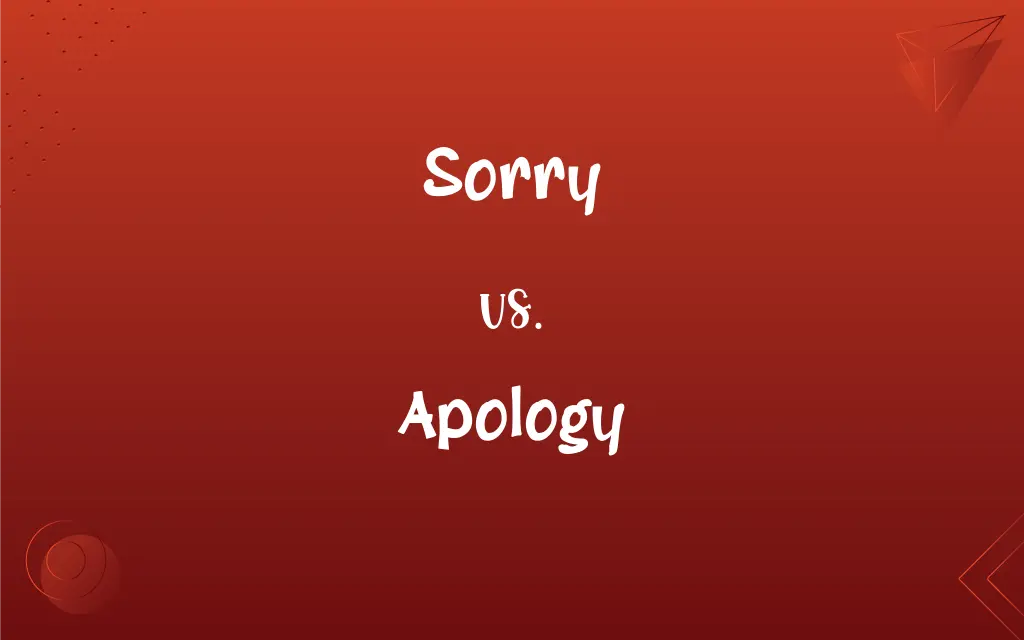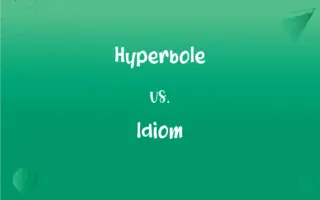Sorry vs. Apology: What's the Difference?
Edited by Aimie Carlson || By Harlon Moss || Updated on October 17, 2023
"Sorry" is an adjective expressing regret or sorrow, while "apology" is a noun denoting a formal expression of regret or remorse.

Key Differences
"Sorry" and "apology" are terms frequently used interchangeably but have distinct nuances in meaning. "Sorry" is an adjective that conveys feelings of regret, sorrow, or compassion. It often acts as an immediate response to an unintended harm or inconvenience. Conversely, an "apology" is a noun referring to a formal statement wherein one acknowledges and expresses regret for a misdeed or offense.
While "sorry" can be spontaneously uttered to express empathy or regret, an "apology" often comes after reflection and typically involves more depth. For example, one might quickly say "sorry" after accidentally stepping on someone's foot, but write a detailed letter of apology after realizing they've deeply hurt someone's feelings.
In communication, using "sorry" can be seen as a more casual way to acknowledge a mistake or inconvenience. On the other hand, offering an "apology" implies a higher level of responsibility and is generally seen as a more formal admission of wrongdoing. It often requires the individual to explain their actions and the reasons behind them.
Furthermore, while "sorry" can be employed in various contexts, ranging from minor regrets to profound remorse, "apology" predominantly indicates a more significant act of contrition. For instance, public figures often issue public apologies for notable missteps, whereas a simple "sorry" may seem insufficient.
Comparison Chart
Part of Speech
Adjective
Noun
ADVERTISEMENT
Depth
Immediate, can be casual
Reflective, often more formal
Usage Context
Can be used for minor to major regrets
Generally for significant acts of contrition
Responsiveness
Spontaneous response to an incident
After reflection on a wrongdoing
Formality
Less formal
More formal
Sorry and Apology Definitions
Sorry
Sorry is an adjective indicating regret.
I'm sorry for being late.
ADVERTISEMENT
Apology
Apology can refer to a written or spoken statement.
She wrote a heartfelt apology letter.
Sorry
Sorry can show a lack of reliability.
The sorry state of the old building was evident.
Apology
Apology suggests a desire for forgiveness.
Her sincere apology mended their strained relationship.
Sorry
Sorry can be used to decline politely.
Sorry, I can't make it tomorrow.
Apology
Apology is an acknowledgment of wrongdoing.
His apology was accepted by the community.
Sorry
Sorry can express a polite request.
Sorry, can you repeat that?
Apology
Apology can refer to a defense or justification.
An apology for his controversial theory was published.
Sorry
Sorry can convey sympathy.
I'm so sorry for your loss.
Apology
Apology is a formal expression of regret.
He issued a public apology for his remarks.
Sorry
Feeling or expressing sorrow
We're sorry to hear that you're leaving so soon.
Apology
An acknowledgment expressing regret or asking pardon for a fault or offense
Please accept my apology for being so late.
Sorry
Feeling or expressing sympathy or pity
She felt sorry for the rain-soaked cat.
Apology
A formal justification or defense.
FAQs
Is "sorry" the same as "apology"?
No, "sorry" is an adjective expressing regret, while "apology" is a formal statement of remorse.
Is an "apology" always spoken?
No, apologies can be both written and spoken.
Can "sorry" be used as a noun?
In informal contexts, "sorry" might be used as a noun, but "apology" is the standard noun form.
Is every "sorry" an apology?
Not necessarily. While "sorry" can express regret, it doesn't always signify a full apology.
How can one make an effective apology?
An effective apology acknowledges the wrongdoing, understands its impact, and seeks to make amends.
Why might public figures issue a public apology instead of just saying "sorry"?
A public apology typically conveys a deeper acknowledgment of wrongdoing and responsibility.
Is it enough to just say "sorry"?
Depending on the situation, more than a "sorry" might be needed to mend the situation.
Is there a difference between "I'm sorry" and "I apologize"?
While both express regret, "I apologize" may come across as slightly more formal than "I'm sorry."
Does saying "sorry" always mean one is at fault?
No, "sorry" can also be used to express sympathy or politeness.
Can "apology" have meanings other than expressing regret?
Yes, "apology" can also refer to a defense or justification of something.
Is "sorry" always sincere?
The sincerity of "sorry" depends on the speaker's intention. It can be both sincere and insincere.
Can "sorry" be used to express sympathy?
Yes, "sorry" can be used to convey sympathy, such as "I'm sorry for your loss."
Why is apologizing important?
Apologizing can mend relationships, show responsibility, and demonstrate personal growth.
Does culture influence how apologies are given and received?
Yes, the act of apologizing and its reception can vary across cultures.
Can "sorry" be used formally?
While "sorry" can be used in formal settings, "apology" often conveys a deeper sense of responsibility.
Is "sorry" more casual than "apology"?
Generally, yes. "Sorry" can be seen as more immediate and casual, while "apology" is more formal.
What's the origin of the word "sorry"?
"Sorry" originates from Old English "sārig," meaning distressed or full of sorrow.
Is there a formal way to offer an apology?
A formal apology often includes acknowledgment of the mistake, understanding its impact, and a commitment to change.
Can businesses issue apologies?
Yes, businesses often issue apologies for mistakes or offenses to their customers.
How can one respond to an apology?
Responses vary, but common ones include "I accept your apology" or "Thank you for apologizing."
About Author
Written by
Harlon MossHarlon is a seasoned quality moderator and accomplished content writer for Difference Wiki. An alumnus of the prestigious University of California, he earned his degree in Computer Science. Leveraging his academic background, Harlon brings a meticulous and informed perspective to his work, ensuring content accuracy and excellence.
Edited by
Aimie CarlsonAimie Carlson, holding a master's degree in English literature, is a fervent English language enthusiast. She lends her writing talents to Difference Wiki, a prominent website that specializes in comparisons, offering readers insightful analyses that both captivate and inform.
































































